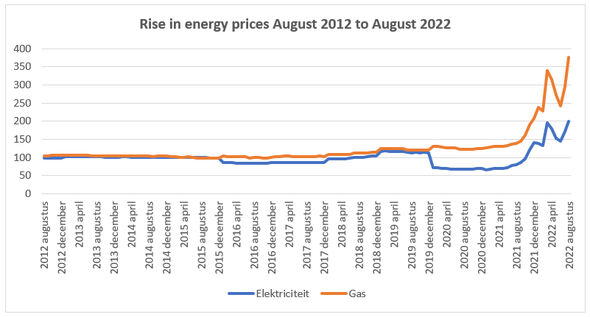In common with everyone, higher education is suffering from the increased cost of energy. There are huge sums involved. In 2021, the universities together spent nearly 100 million euros on water and energy, according to their annual reports.
Of all the universities, Utrecht paid the most: 16 million euros. A spokesperson confirmed that the rates for this year are fixed but that next year the university expects the costs to rise threefold to 48 million euros.
Maastricht University also expects higher prices now that the institution has had to cancel its contract with the Russian energy supplier Gazprom. The bill will increase by 5 to 8 million euros, University President Rianne Letschert predicted on Radio 1. The buildings will probably close early to keep heating costs down and from now on every winter’s day will be ‘Warm Sweater Day’.
Eindhoven
The TU/e is dealing with similar issues. The university had already purchased gas from Gazprom up until 2024, but decided to terminate the contract by the first of October, in accordance with European packages of sanctions, says Thijs Meulen, who’s Energy Management consultant at TU/e. The university will switch to Greenchoice. “The costs will go up, from 15 euro cents to 2 euros per cubic meter of gas. That means that this year alone we already have to pay at least a million euros more, and that’s only the fourth quarter.”
If the high price the university has to pay will also have the desired effect on limiting the Russian acts of war in Ukraine remains to be seen, because Gazprom can now sell the gas that becomes available for much more than the original price to new buyers. Meulen finds it hard to swallow. “As a university we took all the necessary steps. Now the government all of a sudden tells us that immediately terminating the contracts with Gazprom was difficult or even impossible to execute and therefore the TU/e would have been able to get an exemption until Januari 1st of 2023.” To reverse the decision is impossible now, but the university should not want to anyway, Meulen thinks. “Switching to Greenchoice instinctively was still the right choice.”
Down the drain
If the total energy bill rises threefold, the universities will have to find an additional 200 million euros. Gas and power would take a substantial bite out of the extra money they are getting from the government for higher education and research.
Response from the Ministry of Education, Culture and Science
The Ministry of Education, Culture and Science is in discussion with the higher education sector, according to the spokesperson for Education Minister Robbert Dijkgraaf. Thanks to the annual wage and price adjustments and the reduction in energy tax, institutions can “cover the price rises, at least partially”. Here is the response in full:
“The Ministry of Education, Culture and Science is in discussion with the higher education sector over the developments relating to rising energy prices. The Ministry currently has no signals to the effect that institutions will experience continuity problems as a result of the price rises. The impact of the rising energy prices on educational institutions fluctuates and depends largely on whether institutions have fixed or variable contracts and when they concluded them.
The whole of the Netherlands faces or will face higher energy prices. Every year, institutions receive an annual wage and price adjustment in relation to their funding, which enables them to coverthe price rises, at least partially. Additionally, the government has provided compensation in 2022, in particular via the Energy Tax. Educational institutions are eligible for this as well. A decision will be taken in the spring of 2023 about the price adjustment for 2023; the price rises are likely to be reflected in that, at least partially.”




Discussion